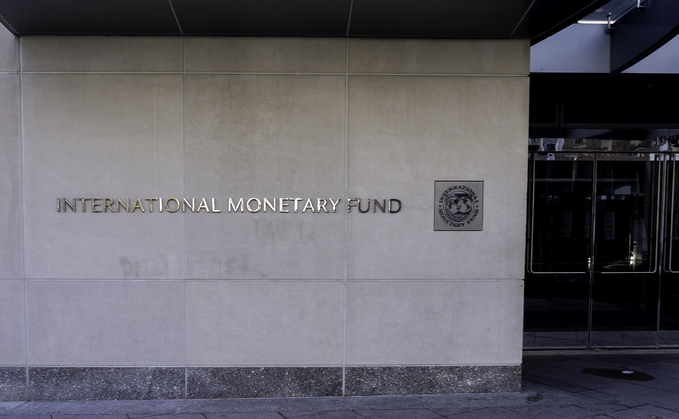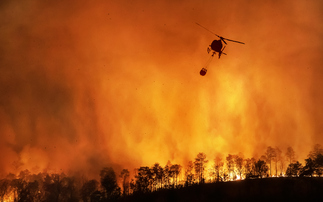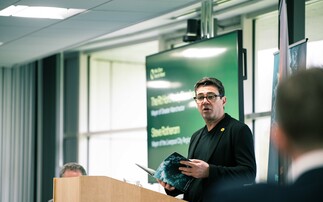Credit: iStock
Stephen Fry, Annie Lennox, Christiana Figueres, Forest Whitaker, and Paul Polman among those calling on G20 leaders to support global financial reforms to tackle debt and climate crises
More than 100 influential figures - from Hollywood actors and international popstars to global business figures and former world leaders - have joined the growing chorus of calls for major global financial reforms to help tackle the "unfair debt" they argue is stifling action to tackle the climate crisis and meet the UN's Sustainable Development Goals (SDGs).
In a letter addressed to G20 leaders today, which comes as the World Bank and International Monetary Fund (IMF) prepare to hold their annual Spring Meetings in Washington DC this week, scores of actors, musicians, politicians, economists, and campaign groups have called for major reforms to the global financial architecture to catalyse climate action and boost investment in clean technologies, particularly in developing nations.
The open letter, coordinated by non-profit comms agency Project Everyone, has been signed by renowned actors, musicians and authors such as Stephen Fry, Annie Lennox, and Forest Whitaker, as well as former Labour Cabinet Minister David Miliband, former Unilever CEO Paul Polman, and former UN climate chief Christiana Figueres.
The letter urges G20 leaders to triple investment in multilateral development banks - including the World Bank - end "crippling debt" for developing nations, and introduce new measures to 'make polluters pay'. Such demands build on previous on calls for public finance reform led by Barbados Prime Minister Mia Mottley, her Kenyan counterpart William Ruto, and French President Emmanuel Macron.
In recent years Mottley has been championing a package of measures known as the Bridgetown Agenda, which sets out how a series of reforms to international financial institutions could help meet global climate finance goals and reduce the cost of capital for developing economies as they seek to invest in new low carbon and climate resilient infrastructure.
Other signatories of the letter include economist Mariana Mazzucato, filmmaker Richard Curtis, businessman Dr. Mo Ibrahim, and former Conservative Cabinet Minister Rory Stewart.
"The institutions of world finance have lost their muscle," the letter reads. "The world is rocked by conflict, food insecurity, biodiversity loss, and spiralling inflation. All of which are compounded by the devastation wrought by climate change. "The Sustainable Development Goals are under threat. Too many feel scarcity, austerity, despair."
The UN has estimated the total amount needed to achieve the SDGs worldwide is $5.4tr a year by 2030, warning there is currently a near-$3tr shortfall based on current government policies.
Meanwhile, almost 60 per cent of low-income countries worldwide are also now in debt distress, meaning they are spending six times more on simply servicing that debt than the amount the World Bank lends in a year, according to the letter. That, in turn, is hampering the capacity for developing nations to invest in the infrastructure that could allow them to curb greenhouse gas emissions and bolster climate resilience..
The letter - which has also been signed by leading NGOs Save The Children, The ONE Campaign, Oxfam, Project Everyone and Christian Aid - urges G20 leaders, the World Bank, and the IMF to back proposals for reform that could support efforts to achieve the goals of the Paris Agreement.
"Change is already underway," the letter states. "The architects of the World Bank and the IMF earned their place in history. This is your chance to fulfil their promise: to transform these instruments for peace and prosperity and truly set them to work in our common interest. Triple the investment. End crippling debt. Make polluters pay. It's time to taste hope again."
Dr Joyce Banda, former President of the Republic of Malawi and one of the letter's signatories, said African leaders needed to invest in resilience, education, health, and nutrition but are hampered by "unfair debt".
"Climate change has brought untold suffering to our people through loss of infrastructure and arable lands, leading to incessant hunger," she added. "We have no choice but to borrow more, perpetuating the vicious cycle. This has to stop. It's time to transform global public finance to pave the way for a fairer, more stable future for all."
Frustration has long been building over the slow pace of global financial reform to help support developing nations in securing investment in the energy transition, and improving their resilience against worsening climate change impacts and extreme weather. The final agreement brokered at the COP28 Climate Summit in December also faced criticism in some quarters for lacking detail and a clear financial package to adequately support countries embarking on their energy transition.
David Miliband, president and CEO of the International Rescue Committee, highlighted the close links between climate, conflict and poverty worldwide. "The world's most fragile and conflict-affected states are often the most climate-vulnerable," he said. "To end extreme poverty and unlock sustainable development, G20 leaders should back financial architecture reform, deliver more concessional finance via the World Bank's International Development Association, and work with civil society to ensure the money gets to where it's needed most."
The letter comes alongside the launch on Friday of a new '10-point plan' of action designed to help the IMF and World Bank combat Africa's debt crisis.
Coordinated by non-profit groups Power Shift Africa and Earth4All, the action plan has been set out in an open letter which calls on leaders to immediately cancel public external debt payments for all African countries.
The letter argues broken climate finance promises to support African countries' climate goals - estimated at approximately $2.8tr - must be restored, and that climate and development finance should be funnelled into regenerative agriculture and agroecology to restore Africa's food sovereignty and renewable energy deployment that can aid Africa's development rather than be earmarked for export.
Other recommendations in the letter include proposals to overhaul the credit rating practices of the big three agencies - S&P, Moody's, and Fitch - and calls for leaders to commit to urgent reform of the G20 Common Framework, a recently-developed solution to coordinate debt restructuring.
To tackle the debt crisis, the 10-point-plan also urges private lenders to participate in debt reduction and rescheduling of loan repayments from low-income African countries, asks leaders to honour commitments to reallocate the IMF's Special Drawing Rights to vulnerable countries, and calls for a credible reform path for the global debt architecture.
Finally, it states that climate finance debts owed by G20 countries should be paid in the form of unconditional grants and technology transfer, and urges leaders to stop promoting austerity conditions and promote bold, structural and transformative solutions at-scale, not small, superficial solutions.
"The Spring Meetings must be a rallying cry for urgent action to address the root causes of the debt crisis and to commit to meaningful reform of the global financial system and debt architecture," said Sandrine Dixson-Declève, co-president of business group The Club of Rome and executive chair of Earth4All.
"We urge wealthy countries to stop blocking serious reform efforts as they did at the 2023 Annual meetings. They must support proven solutions such as debt cancellation, removal of austerity conditions, fundamental reform of the G20 Common Framework, and increased mobilisation of domestic public resources through greater progressivity in domestic tax systems."
Separately, the International Institute for Environment and Development (IEED) today published a new report arguing that proposed 'debt for climate and nature swaps' could free up more than $100bn of debt in developing countries and deliver a huge increase in investment in projects to restore nature and adapt to climate change.
'Debt for climate and nature swaps' see creditors write off a portion of a nation's debt in exchange for governments committing to achieve specific, measurable, and traceable outcomes through climate or nature projects.
Laura Kelly, the director of IIED's Shaping Sustainable Markets research group, said: "Many of the countries most threatened by rising temperatures have huge debt burdens, and are forever paying interest to wealthier nations that have contributed much more to the climate crisis. Money that could help restore damaged ecosystems and protect vulnerable communities from floods or drought is instead flowing to banks and polluters in the rich world."
The IIED is calling on the IMF and World Bank to actively support and promote debt for nature and climate swaps, arguing the mechanism could provide an effective means for industrialised nations to deliver on their climate finance pledges while helping developing nations meet their climate goals.
"The IMF and World Bank should recognise that the current way of lending just doesn't work for people or the planet," said Kelly. "Our broken financial system must move on from colonialist, 20th-century thinking if it's going to serve everyone fairly."
Want to understand what is going on at the cutting edge of sustainability? Check out BusinessGreen Intelligence - the premier information for professionals focused on the UK's green economy.










